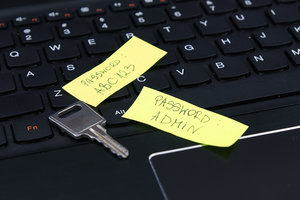The wrong way to use passwords
Passwords have been around since the early days — in 200 B.C., the Romans used them on a day-to-day basis to organize and manage actions of military units.
 With the evolution to the digital age, everyone and their grandmother has acquired a password or two. With that said, this protective measure becomes very unreliable and insecure when people use passwords improperly.
With the evolution to the digital age, everyone and their grandmother has acquired a password or two. With that said, this protective measure becomes very unreliable and insecure when people use passwords improperly.
Experts analyzed how users protect their online accounts in a recent research study. As it turned out, almost one third of those surveyed have two or three similar passwords for ALL of their accounts. Moreover, one in seven respondents uses ONE password for all of their accounts. Aside from the quantity issue, there is also a problem with the quality of combinations used in passwords. One out of 10 respondents come up with passwords that are less than eight characters in length. On top of that, many people (12%, to be more precise) do not use capital letters, figures and/or special characters to improve their passwords. Such combinations are not secure at all.
Bad, right? But wait, there is more! Only a few memorize their passwords. More than a half of respondents store them on a piece of paper, on their phones or in text files on their computers. Approximately a third of users surveyed save passwords in the browser to benefit from quick login feature. Please, remember: if you use one password for all of your accounts, criminals need to hack only one of them to get all they need to compromise all of your other accounts.
Perhaps the scariest thing uncovered by the survey is lack of awareness in regards to safety. A quarter of respondents believe that they are safe, as they keep nothing important on their devices. Unfortunately, culprits do not only hunt for corporate data or government secrets: passwords and logins of every user are in themselves a favorite target of cybercriminals. Depending on their skills, culprits will find a way to use stolen login credentials: for example, they can hack your Internet bank or just use your Facebook account to spread viruses and spam.
Even if you still don’t worry about yourself, it’s time to understand that your weak password can put at risk your friends, relatives, colleagues, business partners and so on. Here are three simple rules, which you should take into account.
- The myth, that it’s hard to invent and remember reliable password is only a myth. There are some methods, which help to invent and memorize several unique passwords at once.
- You need to pay special attention to the safety of your main email address, as the access to other accounts you can recover with the help of email notifications. You can secure your email with the help of two-factor authentication
Do not store your passwords on a piece of paper, on your hard drive or any other device. It’s not secure. Memorize them. If you see that you lack time to get accustomed to strict security rules, use special software.
Axarhöfði 14,
110 Reykjavik, Iceland














